Related Research Articles
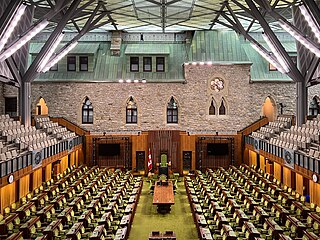
The House of Commons of Canada is the lower house of the Parliament of Canada. Together with the Crown and the Senate of Canada, they comprise the bicameral legislature of Canada.
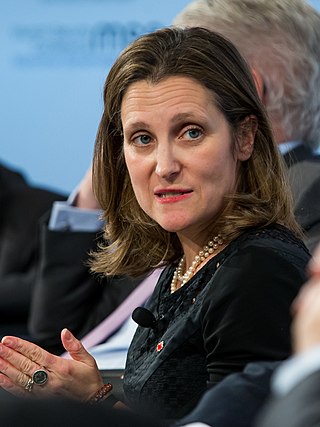
The deputy prime minister of Canada is a minister of the Crown and a member of the Canadian Cabinet. The office is conferred at the discretion of the prime minister and does not have an associated departmental portfolio. Canadian deputy prime ministers are appointed to the Privy Council and styled as the Honourable, a privilege maintained for life.

Fred Rose was a Polish-Canadian politician and trade union organizer, best known for being the only member of the Canadian Parliament to ever be convicted of a charge related to spying for a foreign country. A member of the Communist Party of Canada and Labor-Progressive Party, he served as the MP for Cartier from 1943 to 1947. He was ousted from his seat after being found guilty of conspiring to steal weapons research for the Soviet Union.

Ellen Louks Fairclough was a Canadian politician. A Progressive Conservative member of the House of Commons of Canada from 1950 to 1963, she was the first woman ever to serve in the Canadian Cabinet.
Fairclough is a surname. A variant form is Faircloth. Notable people with the surname include:
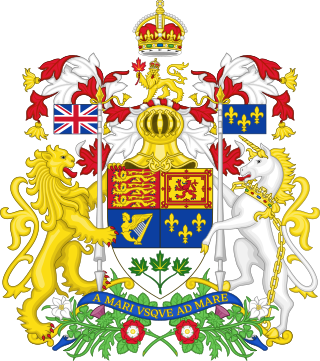
The 22nd Canadian Parliament was in session from November 12, 1953, until April 12, 1957. The membership was set by the 1953 federal election on August 10, 1953, and it changed only somewhat due to resignations and by-elections until it was dissolved prior to the 1957 election.

The 23rd Canadian Parliament was in session from October 14, 1957, until February 1, 1958. The membership was set by the 1957 federal election on June 10, 1957, and it changed only somewhat due to resignations and by-elections until it was dissolved prior to the 1958 election.
Representation by women has been a significant issue in Canadian politics since 1900.
Margaret Aitken was a Canadian author, columnist, journalist, and politician.
Upon the dissolution of the 39th Canadian Parliament, 65 of the 308 seats were held by women. Canada ranks 45th in the world in representation of women in the national lower house.
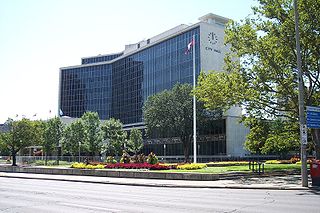
Politically, Hamilton is known for producing groundbreaking, colourful and left-wing politicians. Locally, though, the big political stories have included the controversial amalgamation of Hamilton with its suburbs in 2001, the destruction of green space around the Red Hill Valley to make way for the Red Hill Creek Expressway, and plans to build a Light Rail Transit line in the city.

Ellen Fairclough Building is an 18-storey high-rise office building built in 1981. It is the 5th tallest building in Hamilton, Ontario, Canada. It is situated on the corner of King Street West and MacNab Street South, and is primarily used to house provincial government offices.

Marion Sybil Bennett was a Canadian politician. She represented the electoral district of Halton in the House of Commons of Canada from 1953 until her death.
The 40th Canadian Parliament contained a record number of female Members of Parliament, with 69 women elected to the House of Commons of Canada in the 2008 federal election. However, this represented just 22 per cent of the 308 total MPs, and only a modest gain over the 65 women in the 39th Canadian Parliament.
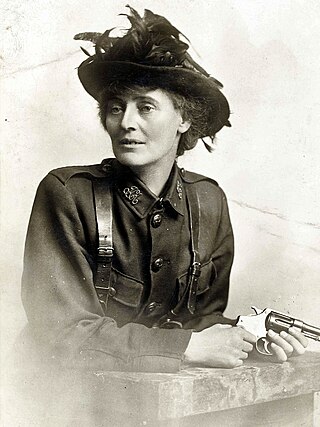
The representation of women in the House of Commons of the United Kingdom has been an issue in the politics of the United Kingdom at numerous points in the 20th and 21st centuries. Originally debate centred on whether women should be allowed to vote and stand for election as Members of Parliament. The Parliament Act 1918 gave women over 21 the right to stand for election as a Member of Parliament. The United Kingdom has had three female Prime Ministers: Margaret Thatcher (1979–1990), Theresa May (2016–2019), and Liz Truss (2022). The publication of the book Women in the House by Elizabeth Vallance in 1979 highlighted the under-representation of women in Parliament. In more modern times concerns about the under-representation of women led the Labour Party to introduce and, decades later, abandon all-women short lists, something which was later held to breach discrimination laws.
The 42nd Canadian Parliament includes a record number of female Members of Parliament, with 88 women elected to the 338-member House of Commons of Canada (26%) in the 2015 election. This represents a gain of twelve seats over the previous record of 76 women in the 41st Canadian Parliament. By contrast, the 114th United States Congress had 105 women sitting in the 435-seat United States House of Representatives.
During the 21st Canadian Parliament, the number of sitting women senators increased. Eleven women ran for seats in the Canadian House of Commons in the 1949 federal election; none were elected. However, Ellen Fairclough, who had run unsuccessfully in the Hamilton West riding as a Progressive Conservative, was elected in a May 1950 by-election held after the incumbent was appointed to the Ontario Supreme Court.
The number of women sitting in the House of Commons increased to six during the 26th Canadian Parliament; the number of women senators remained at six. 40 women ran for seats in the Canadian House of Commons in the 1963 federal election; two women out of five incumbents were reelected. Ellen Fairclough, Isabel Hardie and Margaret Mary Macdonald were defeated when they ran for reelection. Pauline Jewett and Margaret Konantz were elected to the House of Commons in the general election; Eloise Jones and Margaret Rideout were elected in by-elections held in June 1964.